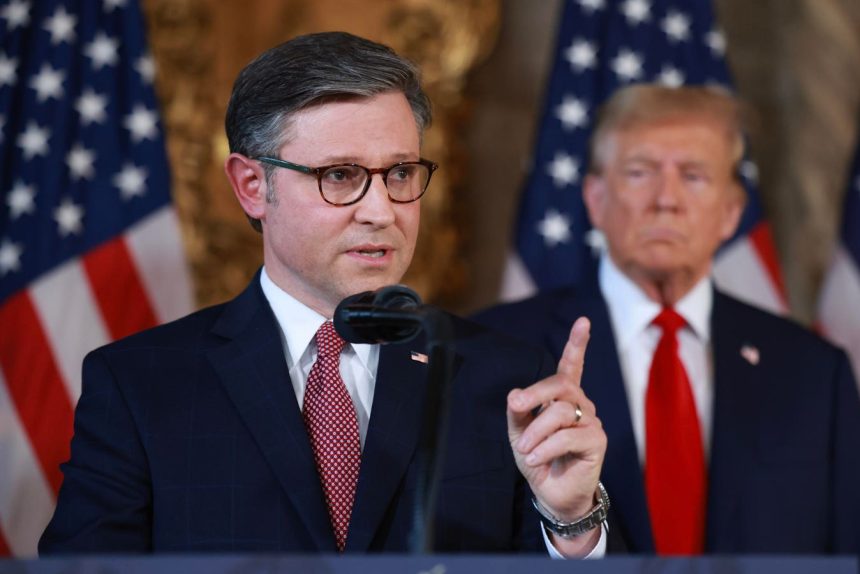The looming threat of a government shutdown was averted at the eleventh hour on Friday when the House of Representatives overwhelmingly approved a stopgap funding bill. This came after a week of political maneuvering and contentious debate over spending priorities and the debt ceiling, with President-elect Donald Trump inserting himself into the fray and expressing his willingness to see a shutdown occur under the current Biden administration. The bill, which provides temporary funding for federal operations and disaster relief, passed with broad bipartisan support, with only 34 Republicans voting against it. Notably, no Democrats opposed the measure. The bill now heads to the Senate for consideration, where its passage is expected. While President Biden endorsed the bill, the White House acknowledged that it did not encompass all of their desired provisions.
The path to this compromise was fraught with complexities. Initially, House Speaker Mike Johnson intended to present separate bills for a vote, including one specifically addressing government funding. However, following discussions with House Minority Leader Hakeem Jeffries, Johnson shifted his strategy and opted to combine the measures into a single bill, recognizing the potential for securing Democrat support to ensure its passage. This strategic move proved successful in garnering the necessary votes to prevent a shutdown. The previous spending bill, proposed on Thursday, had failed to gain traction, with a significant number of Republicans joining Democrats in opposition. That bill would have extended government funding until mid-March and suspended the debt ceiling for two years. It garnered support from Trump, who urged both parties to vote in its favor.
President-elect Trump’s stance on the government shutdown added an additional layer of complexity to the negotiations. In a post on his social media platform, Truth Social, Trump indicated he was unconcerned about a shutdown occurring as long as it remained within the Biden administration’s tenure. He framed the issue as a problem for Biden to solve, though he suggested Republicans might offer assistance. This stance seemingly contradicts his earlier support for the Thursday bill, which aimed to avert a shutdown. This apparent shift in position underscores the volatile political climate surrounding government funding and the debt ceiling.
The earlier spending proposals had faced criticism, particularly regarding provisions related to government oversight and congressional pay increases. Trump and his close ally, Elon Musk, had publicly denounced a Tuesday bill that never came to a vote, arguing it contained unfavorable elements for taxpayers. Trump criticized the bill for including benefits for government censors and a pay raise for Congress while Americans faced economic hardships. Musk echoed these sentiments, characterizing the bill as one of the worst ever drafted. The contentious debate over the debt ceiling further complicated the negotiations. Trump had advocated for suspending or eliminating the debt ceiling altogether, a position that met resistance from some fiscally conservative Republicans. While Trump has not specifically addressed the failure of the Thursday bill, he reiterated his call for addressing the debt ceiling, emphasizing that the issue ultimately rests on the shoulders of the president.
The Friday bill notably omitted the debt ceiling increase that Trump had previously demanded. This exclusion likely contributed to its successful passage in the House, as the debt ceiling issue has been a major point of contention between the two parties. However, the temporary nature of the funding provided by the bill means that the government will likely face another shutdown deadline in the near future, unless a long-term spending agreement can be reached. The differing priorities of the two parties, particularly regarding spending levels and the debt ceiling, pose significant challenges to reaching a lasting solution.
The potential consequences of a government shutdown had loomed large. Had the Friday bill failed, various government services could have been disrupted, potentially impacting Medicare applications, furloughing federal employees, and reducing the number of air traffic controllers and TSA agents. This could have led to travel delays during the holiday season, further exacerbating the challenges faced by the public. However, essential services, such as power grid maintenance, border protection, and in-hospital medical care, were expected to continue operating even in the event of a shutdown. The averted shutdown, albeit temporary, provides a reprieve and allows for further negotiations on a long-term spending plan. The upcoming negotiations will likely be intense, with both sides needing to compromise to reach a viable agreement. The political stakes are high, especially as the midterm elections approach. The outcome of these negotiations will have a significant impact on the government’s ability to function effectively and address the nation’s pressing needs.



